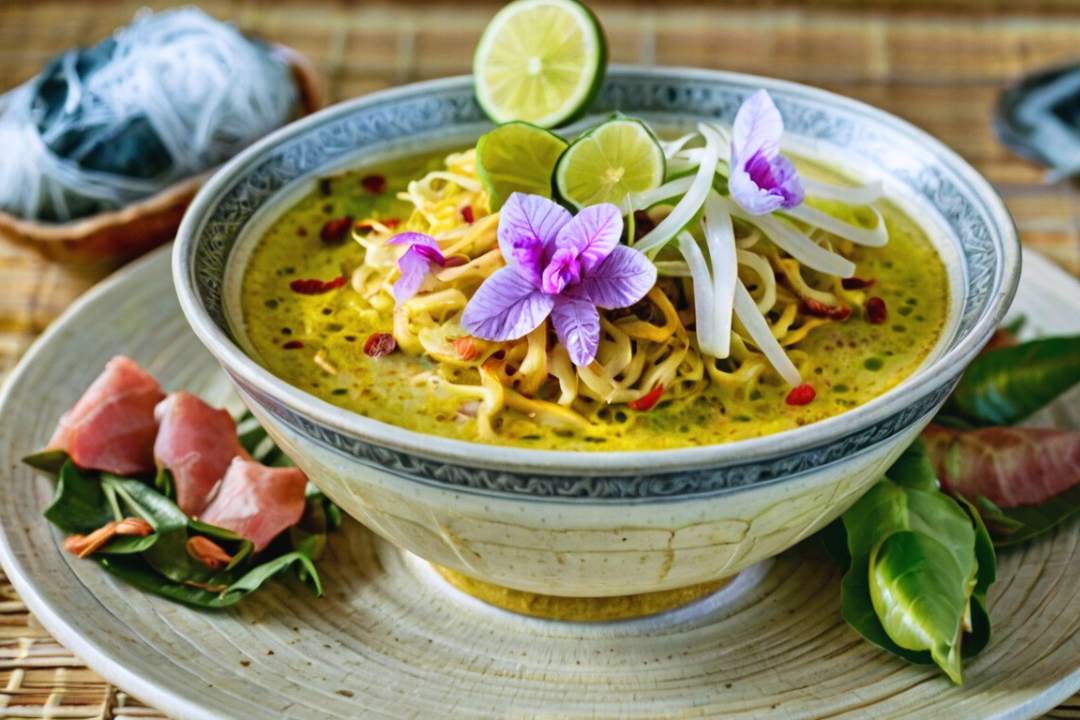The Khmer Noodle Secret: How Nom Banh Chok Will Change Your Lunch Game!
Transform your lunch routine with Nom Banh Chok—fresh, flavorful, and irresistibly tasty Khmer noodles!

Recipe Index
- Fish Amok
- Lok Lak (Stir-fried Beef)
- Nom Banh Chok (Khmer Noodles)
- Samlor Korko (Stirring Pot Soup)
- Beef Saraman Curry
- Char Kroeung Sach Ko (Stir-fried Lemongrass Beef)
- Bai Sach Chrouk (Pork and Rice)
- Kuy Teav (Noodle Soup)
- Prahok Ktis (Pork and Coconut Dip)
- Num Ansom Chek (Banana Sticky Rice Cake)
- Lap Khmer (Lime-marinated Khmer Beef Salad)
- Char Kdav (Caramelized Palm Sugar Chicken)
- Maam Snoul (Fermented Fish)
- Nom Kong (Khmer Donuts)
- Twa Ko (Khmer Sausage)
Nom Banh Chok (នំបញ្ចុក)
Overview
Nom Banh Chok, often referred to as “Khmer noodles,” is a beloved Cambodian dish featuring rice noodles served with a fish-based curry sauce and an abundance of fresh vegetables and herbs. This refreshing meal is a staple of Cambodian cuisine and a favorite breakfast dish throughout the country.
Cultural Significance
Historical Context
Nom Banh Chok has deep roots in Khmer culture, with some food historians tracing its origins back to the Angkorian era. The dish exemplifies the Khmer culinary tradition of combining complex flavors with simple, fresh ingredients.
Social Importance
Often sold by street vendors in the early morning, Nom Banh Chok plays a significant role in daily Cambodian life. It’s not just a meal, but a social activity, with people gathering to enjoy the dish together.
When It’s Eaten
Traditionally a breakfast food, Nom Banh Chok is now enjoyed throughout the day. In Siem Reap, you’ll find it served from dawn at local markets and street corners, making it a perfect dish for early-rising tourists exploring the temples of Angkor.
Key Information
- Preparation Time: 30 minutes (not including noodle-making time)
- Cooking Time: 1 hour
- Total Time: 1 hour 30 minutes
- Difficulty Level: Medium
- Servings: 4
Ingredients
For the curry sauce:
- 500g white fish (such as snakehead fish), cleaned and cut into chunks
- 2 tbsp kroeung (Khmer curry paste)
- 2 cups coconut milk
- 2 tbsp fish sauce
- 1 tbsp palm sugar
- 2 kaffir lime leaves, finely sliced
For serving:
- 500g rice noodles (fresh if available, or dried and cooked according to package instructions)
- 2 cups bean sprouts
- 1 cucumber, sliced
- 1 banana flower, thinly sliced (optional)
- 1 cup long beans, sliced
- 1 cup holy basil leaves
- 1 cup mint leaves
- 2 limes, cut into wedges
Notes on Ingredients
- Fresh rice noodles can be found at the Old Market (Psar Chas) in Siem Reap.
- If banana flower is unavailable, shredded cabbage can be used as a substitute.
Instructions
Preparing the curry sauce:
- In a large pot, bring 4 cups of water to a boil. Add the fish and simmer for 10 minutes until cooked through.
- Remove the fish, reserving the cooking liquid. Debone and flake the fish.
- In the same pot, combine the kroeung with 1/2 cup of coconut milk and cook over medium heat until fragrant, about 2-3 minutes.
- Add the flaked fish, remaining coconut milk, fish sauce, and palm sugar. Simmer for 15-20 minutes.
- Add the reserved cooking liquid and simmer for another 10 minutes. The sauce should be slightly thick but still pourable.
Assembling the dish:
- Divide the rice noodles among serving bowls.
- Ladle the warm curry sauce over the noodles.
- Arrange bean sprouts, cucumber slices, banana flower (if using), and long beans on top.
- Garnish with holy basil and mint leaves.
- Serve with lime wedges on the side.
Serving Suggestions
- Traditionally, all vegetables and herbs are served on a separate plate, allowing diners to add them as they eat.
- Some prefer to mix all ingredients together before eating, while others add vegetables gradually.
Beverage Pairings
- Non-alcoholic: Iced lemongrass tea or fresh coconut water.
- Alcoholic: A light lager beer or a crisp white wine like Sauvignon Blanc.
Nutritional Information
- Calories: Approximately 400 per serving
- Protein: 20g
- Carbs: 60g
- Fats: 10g
- Rich in vitamins and minerals from the variety of fresh vegetables and herbs
Variations
Regional Differences
- Siem Reap style: Often includes a tomato-based sauce instead of curry.
- Southern style: May include prahok (fermented fish paste) for a stronger flavor.
Modern Twists
- Some upscale restaurants in Siem Reap offer a deconstructed version with grilled fish instead of curry.
- Vegetarian versions replace fish with tofu or mushrooms and use soy sauce instead of fish sauce.
Cultural Notes
- The name “Nom Banh Chok” refers to the rice noodles themselves, which were traditionally made by hand through a labor-intensive process.
- The dish is sometimes called “Khmer noodles” to distinguish it from similar noodle dishes in neighboring countries.
Chef’s Tips
- The key to great Nom Banh Chok is the balance of flavors in the sauce and the freshness of the vegetables.
- Don’t overcook the noodles; they should be slightly firm to complement the soft texture of the curry.
- Adjust the fish sauce and palm sugar to achieve the perfect balance of salty and sweet in the curry.
Related Experiences
- Early morning tour of Siem Reap’s Old Market, including a Nom Banh Chok breakfast from a local vendor.
- Cooking class at “Lily’s Secret Garden Cooking School” where you can learn to make Nom Banh Chok from scratch.
- Visit to a local rice noodle producer to see the traditional noodle-making process.
Editor’s Note: Get ready to taste the flavors of Cambodia! Nom Banh Chok, also known as “Khmer noodles,” is a delicious and refreshing dish that’s much more than just food. This article will take you on a culinary adventure, exploring its history, cultural significance, and how to make it at home.
Key Takeaways
- A Taste of Tradition: Nom Banh Chok isn’t just a meal, it’s a window into Cambodian culture. It’s a dish that’s been enjoyed for centuries, reflecting the country’s love for fresh ingredients and complex flavors.
- More Than Noodles: This dish is more than just rice noodles! It’s a symphony of textures and tastes, featuring a fragrant curry sauce, crunchy vegetables, and vibrant herbs.
- A Meal for All Occasions: While traditionally a breakfast dish, Nom Banh Chok is enjoyed throughout the day in Cambodia. It’s a popular choice for street vendors and a delicious option for early-rising tourists exploring the ancient temples of Angkor.
- A World of Flavors: The curry sauce is the heart of Nom Banh Chok. It’s made with fish, coconut milk, and a fragrant blend of spices called *kroeung*. Each region of Cambodia has its own unique twist, adding even more flavor to this already delicious dish!
- A Culinary Adventure: Beyond the traditional recipe, Nom Banh Chok is constantly evolving. Modern chefs are experimenting with new ingredients and techniques, creating innovative versions that are just as delicious as the original.
- Bonus Takeaway: Make sure to savor the experience! Nom Banh Chok is best enjoyed with friends and family, sharing the joy of this unique and flavorful Cambodian tradition.
Featured
Explore more on My Siem Reap Tours
Koh Ker and Beng Mealea guided tour | Banteay Srei temple tour semi-private guided tour | Angkor Wat Sunrise shared tour | Koh Ker and Beng Mealea guided tour | Morning Siem Reap floating village tour | Afternoon Siem Reap floating village tour | Private Angkor Wat special tour | Kulen Waterfall small group guided Tour | Private Angkor Wat mix temples photo tour














